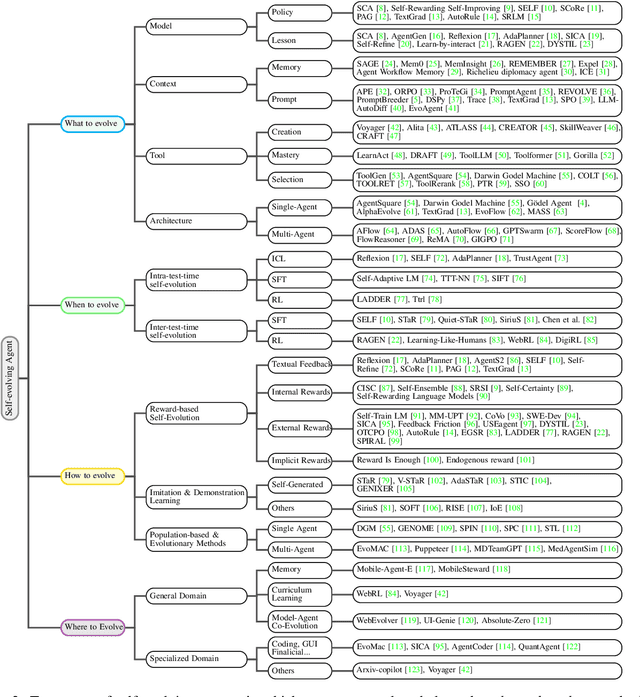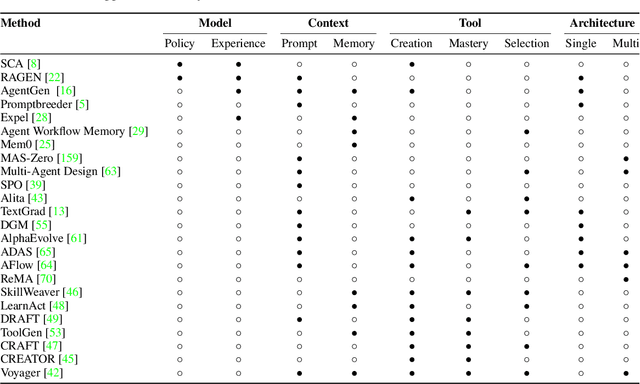Minda Hu
Search-R2: Enhancing Search-Integrated Reasoning via Actor-Refiner Collaboration
Feb 03, 2026Abstract:Search-integrated reasoning enables language agents to transcend static parametric knowledge by actively querying external sources. However, training these agents via reinforcement learning is hindered by the multi-scale credit assignment problem: existing methods typically rely on sparse, trajectory-level rewards that fail to distinguish between high-quality reasoning and fortuitous guesses, leading to redundant or misleading search behaviors. To address this, we propose Search-R2, a novel Actor-Refiner collaboration framework that enhances reasoning through targeted intervention, with both components jointly optimized during training. Our approach decomposes the generation process into an Actor, which produces initial reasoning trajectories, and a Meta-Refiner, which selectively diagnoses and repairs flawed steps via a 'cut-and-regenerate' mechanism. To provide fine-grained supervision, we introduce a hybrid reward design that couples outcome correctness with a dense process reward quantifying the information density of retrieved evidence. Theoretically, we formalize the Actor-Refiner interaction as a smoothed mixture policy, proving that selective correction yields strict performance gains over strong baselines. Extensive experiments across various general and multi-hop QA datasets demonstrate that Search-R2 consistently outperforms strong RAG and RL-based baselines across model scales, achieving superior reasoning accuracy with minimal overhead.
Probability-Entropy Calibration: An Elastic Indicator for Adaptive Fine-tuning
Feb 02, 2026Abstract:Token-level reweighting is a simple yet effective mechanism for controlling supervised fine-tuning, but common indicators are largely one-dimensional: the ground-truth probability reflects downstream alignment, while token entropy reflects intrinsic uncertainty induced by the pre-training prior. Ignoring entropy can misidentify noisy or easily replaceable tokens as learning-critical, while ignoring probability fails to reflect target-specific alignment. RankTuner introduces a probability--entropy calibration signal, the Relative Rank Indicator, which compares the rank of the ground-truth token with its expected rank under the prediction distribution. The inverse indicator is used as a token-wise Relative Scale to reweight the fine-tuning objective, focusing updates on truly under-learned tokens without over-penalizing intrinsically uncertain positions. Experiments on multiple backbones show consistent improvements on mathematical reasoning benchmarks, transfer gains on out-of-distribution reasoning, and pre code generation performance over probability-only or entropy-only reweighting baselines.
ConMax: Confidence-Maximizing Compression for Efficient Chain-of-Thought Reasoning
Jan 08, 2026Abstract:Recent breakthroughs in Large Reasoning Models (LRMs) have demonstrated that extensive Chain-of-Thought (CoT) generation is critical for enabling intricate cognitive behaviors, such as self-verification and backtracking, to solve complex tasks. However, this capability often leads to ``overthinking'', where models generate redundant reasoning paths that inflate computational costs without improving accuracy. While Supervised Fine-Tuning (SFT) on reasoning traces is a standard paradigm for the 'cold start' phase, applying existing compression techniques to these traces often compromises logical coherence or incurs prohibitive sampling costs. In this paper, we introduce ConMax (Confidence-Maximizing Compression), a novel reinforcement learning framework designed to automatically compress reasoning traces while preserving essential reasoning patterns. ConMax formulates compression as a reward-driven optimization problem, training a policy to prune redundancy by maximizing a weighted combination of answer confidence for predictive fidelity and thinking confidence for reasoning validity through a frozen auxiliary LRM. Extensive experiments across five reasoning datasets demonstrate that ConMax achieves a superior efficiency-performance trade-off. Specifically, it reduces inference length by 43% over strong baselines at the cost of a mere 0.7% dip in accuracy, proving its effectiveness in generating high-quality, efficient training data for LRMs.
A Survey of Self-Evolving Agents: On Path to Artificial Super Intelligence
Jul 28, 2025



Abstract:Large Language Models (LLMs) have demonstrated strong capabilities but remain fundamentally static, unable to adapt their internal parameters to novel tasks, evolving knowledge domains, or dynamic interaction contexts. As LLMs are increasingly deployed in open-ended, interactive environments, this static nature has become a critical bottleneck, necessitating agents that can adaptively reason, act, and evolve in real time. This paradigm shift -- from scaling static models to developing self-evolving agents -- has sparked growing interest in architectures and methods enabling continual learning and adaptation from data, interactions, and experiences. This survey provides the first systematic and comprehensive review of self-evolving agents, organized around three foundational dimensions -- what to evolve, when to evolve, and how to evolve. We examine evolutionary mechanisms across agent components (e.g., models, memory, tools, architecture), categorize adaptation methods by stages (e.g., intra-test-time, inter-test-time), and analyze the algorithmic and architectural designs that guide evolutionary adaptation (e.g., scalar rewards, textual feedback, single-agent and multi-agent systems). Additionally, we analyze evaluation metrics and benchmarks tailored for self-evolving agents, highlight applications in domains such as coding, education, and healthcare, and identify critical challenges and research directions in safety, scalability, and co-evolutionary dynamics. By providing a structured framework for understanding and designing self-evolving agents, this survey establishes a roadmap for advancing adaptive agentic systems in both research and real-world deployments, ultimately shedding lights to pave the way for the realization of Artificial Super Intelligence (ASI), where agents evolve autonomously, performing at or beyond human-level intelligence across a wide array of tasks.
WebCoT: Enhancing Web Agent Reasoning by Reconstructing Chain-of-Thought in Reflection, Branching, and Rollback
May 26, 2025Abstract:Web agents powered by Large Language Models (LLMs) show promise for next-generation AI, but their limited reasoning in uncertain, dynamic web environments hinders robust deployment. In this paper, we identify key reasoning skills essential for effective web agents, i.e., reflection & lookahead, branching, and rollback, and curate trajectory data that exemplifies these abilities by reconstructing the agent's (inference-time) reasoning algorithms into chain-of-thought rationales. We conduct experiments in the agent self-improving benchmark, OpenWebVoyager, and demonstrate that distilling salient reasoning patterns into the backbone LLM via simple fine-tuning can substantially enhance its performance. Our approach yields significant improvements across multiple benchmarks, including WebVoyager, Mind2web-live, and SimpleQA (web search), highlighting the potential of targeted reasoning skill enhancement for web agents.
A Survey of Personalized Large Language Models: Progress and Future Directions
Feb 17, 2025Abstract:Large Language Models (LLMs) excel in handling general knowledge tasks, yet they struggle with user-specific personalization, such as understanding individual emotions, writing styles, and preferences. Personalized Large Language Models (PLLMs) tackle these challenges by leveraging individual user data, such as user profiles, historical dialogues, content, and interactions, to deliver responses that are contextually relevant and tailored to each user's specific needs. This is a highly valuable research topic, as PLLMs can significantly enhance user satisfaction and have broad applications in conversational agents, recommendation systems, emotion recognition, medical assistants, and more. This survey reviews recent advancements in PLLMs from three technical perspectives: prompting for personalized context (input level), finetuning for personalized adapters (model level), and alignment for personalized preferences (objective level). To provide deeper insights, we also discuss current limitations and outline several promising directions for future research. Updated information about this survey can be found at the https://github.com/JiahongLiu21/Awesome-Personalized-Large-Language-Models.
NILE: Internal Consistency Alignment in Large Language Models
Dec 21, 2024Abstract:As a crucial step to enhance LLMs alignment with human intentions, Instruction Fine-Tuning (IFT) has a high demand on dataset quality. However, existing IFT datasets often contain knowledge that is inconsistent with LLMs' internal knowledge learned from the pre-training phase, which can greatly affect the efficacy of IFT. To address this issue, we introduce NILE (iNternal consIstency aLignmEnt) framework, aimed at optimizing IFT datasets to unlock LLMs' capability further. NILE operates by eliciting target pre-trained LLM's internal knowledge corresponding to instruction data. The internal knowledge is leveraged to revise the answer in IFT datasets. Additionally, we propose a novel Internal Consistency Filtering (ICF) method to filter training samples, ensuring its high consistency with LLM's internal knowledge. Our experiments demonstrate that NILE-aligned IFT datasets sharply boost LLM performance across multiple LLM ability evaluation datasets, achieving up to 66.6% gain on Arena-Hard and 68.5% on Alpaca-Eval V2. Further analysis confirms that each component of the NILE}framework contributes to these substantial performance improvements, and provides compelling evidence that dataset consistency with pre-trained internal knowledge is pivotal for maximizing LLM potential.
Purple-teaming LLMs with Adversarial Defender Training
Jul 01, 2024Abstract:Existing efforts in safeguarding LLMs are limited in actively exposing the vulnerabilities of the target LLM and readily adapting to newly emerging safety risks. To address this, we present Purple-teaming LLMs with Adversarial Defender training (PAD), a pipeline designed to safeguard LLMs by novelly incorporating the red-teaming (attack) and blue-teaming (safety training) techniques. In PAD, we automatically collect conversational data that cover the vulnerabilities of an LLM around specific safety risks in a self-play manner, where the attacker aims to elicit unsafe responses and the defender generates safe responses to these attacks. We then update both modules in a generative adversarial network style by training the attacker to elicit more unsafe responses and updating the defender to identify them and explain the unsafe reason. Experimental results demonstrate that PAD significantly outperforms existing baselines in both finding effective attacks and establishing a robust safe guardrail. Furthermore, our findings indicate that PAD excels in striking a balance between safety and overall model quality. We also reveal key challenges in safeguarding LLMs, including defending multi-turn attacks and the need for more delicate strategies to identify specific risks.
Enhancing Biomedical Knowledge Retrieval-Augmented Generation with Self-Rewarding Tree Search and Proximal Policy Optimization
Jun 17, 2024



Abstract:Large Language Models (LLMs) have shown great potential in the biomedical domain with the advancement of retrieval-augmented generation (RAG). However, existing retrieval-augmented approaches face challenges in addressing diverse queries and documents, particularly for medical knowledge queries, resulting in sub-optimal performance. To address these limitations, we propose a novel plug-and-play LLM-based retrieval method called Self-Rewarding Tree Search (SeRTS) based on Monte Carlo Tree Search (MCTS) and a self-rewarding paradigm. By combining the reasoning capabilities of LLMs with the effectiveness of tree search, SeRTS boosts the zero-shot performance of retrieving high-quality and informative results for RAG. We further enhance retrieval performance by fine-tuning LLMs with Proximal Policy Optimization (PPO) objectives using the trajectories collected by SeRTS as feedback. Controlled experiments using the BioASQ-QA dataset with GPT-3.5-Turbo and LLama2-7b demonstrate that our method significantly improves the performance of the BM25 retriever and surpasses the strong baseline of self-reflection in both efficiency and scalability. Moreover, SeRTS generates higher-quality feedback for PPO training than self-reflection. Our proposed method effectively adapts LLMs to document retrieval tasks, enhancing their ability to retrieve highly relevant documents for RAG in the context of medical knowledge queries. This work presents a significant step forward in leveraging LLMs for accurate and comprehensive biomedical question answering.
Mitigating Large Language Model Hallucination with Faithful Finetuning
Jun 17, 2024



Abstract:Large language models (LLMs) have demonstrated remarkable performance on various natural language processing tasks. However, they are prone to generating fluent yet untruthful responses, known as "hallucinations". Hallucinations can lead to the spread of misinformation and cause harm in critical applications. Mitigating hallucinations is challenging as they arise from factors such as noisy data, model overconfidence, lack of knowledge, and the generation process itself. Recent efforts have attempted to address this issue through representation editing and decoding algorithms, reducing hallucinations without major structural changes or retraining. However, these approaches either implicitly edit LLMs' behavior in latent space or suppress the tendency to output unfaithful results during decoding instead of explicitly modeling on hallucination. In this work, we introduce Faithful Finetuning (F2), a novel method that explicitly models the process of faithful question answering through carefully designed loss functions during fine-tuning. We conduct extensive experiments on popular datasets and demonstrate that F2 achieves significant improvements over vanilla models and baselines.
 Add to Chrome
Add to Chrome Add to Firefox
Add to Firefox Add to Edge
Add to Edge